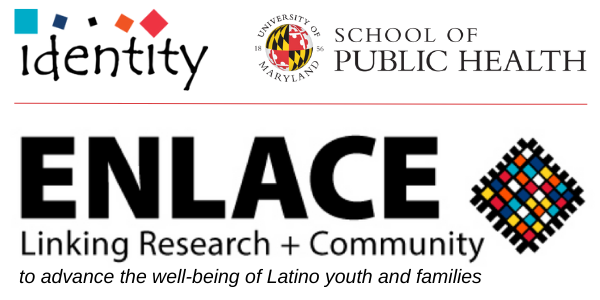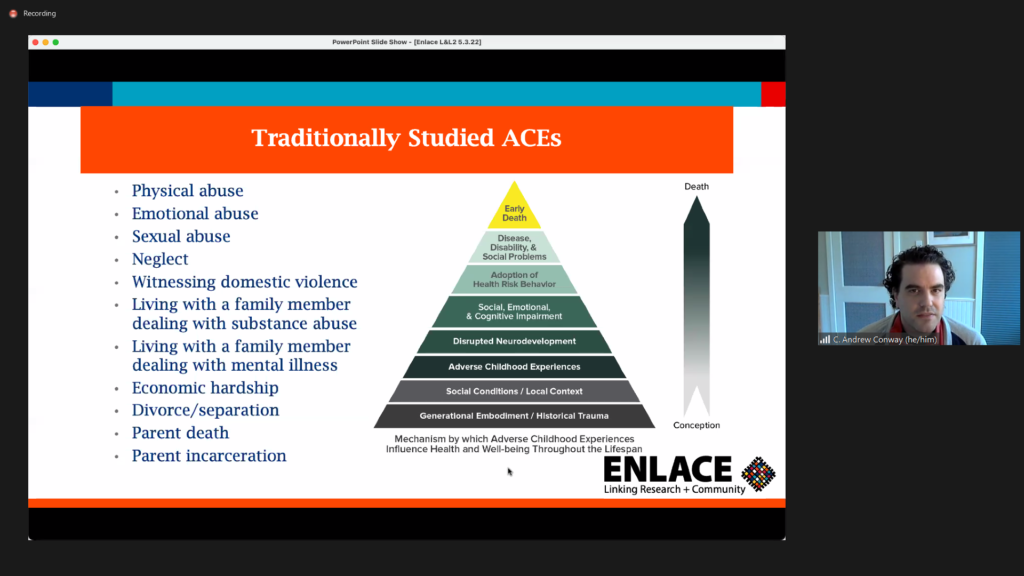
Identity is excited to announce the official launch of Enlace, our joint project with researchers at the University of Maryland School of Public Health (UMD SPH). In Spanish, “enlace” means link or connection. We use this word to describe a weaving together of research and community with a shared mission of strengthening the wellbeing of Latino youth and families in our community.
Since 2018, researchers at UMD SPH in the Department of Family Science have worked closely with leaders of Identity to develop, implement and assess programming for immigrant Latino youth and their families. This ongoing practice/research relationship combines Identity’s long-standing expertise in advocacy and effective youth and family programming with UMD SPH’s theoretically informed basic and applied research in public health and family science.
Over the past month, we have hosted a series of three Lunch & Learn presentations showcasing how we are working together to advance the wellbeing of Latino youth and families. Read on for a summary of the three Lunch & Learn sessions, and where the partnership plans to go from here.
Discussion #1 – Healing through community-based emotional support
“This program has been very important for me. By participating as a Community Mental Health Worker, I’ve been able to develop strategies to manage my own wellbeing as well as that of my family, my husband and my children.”
Milagro Flores, Identity Community Mental Health Worker
The first Lunch & Learn explored how Identity’s community-led non-clinical emotional support groups (Encuentros) have been helping to address the ongoing mental health impacts of the pandemic and other traumas. Identity Program Director Carolyn Camacho explained how Encuentros was built with and for community members, in the belief that our community has the capacity to heal itself by harnessing the power of sharing and listening to each other in a confidential space. Over the past year, Identity has hosted 67 Encuentros groups for nearly 670 members of the community. The Encuentros groups are made possible with support from Montgomery County’s Department of Health and Human Services and Latino Health Initiative, the Healthcare Initiative Foundation, Giving Together, Adventist HealthCare and the Annie E. Casey Foundation.
Professors Amy Lewin and Kevin Roy shared extremely promising results from UMD SPH’s initial evaluation sessions. “In my 20-plus years of doing community-based program evaluation, what I’ve seen with Encuentros is really like nothing else,” Dr. Lewin said. “The degree of interest, participation, and engagement from members of the community has been so far beyond what any of us had expected – it has become really clear to us from talking with participants that this program is meeting an enormous need in the community.”
Two Community Mental Health Workers, who have been co-facilitating Encuentros groups supported by Identity staff, closed the talk with powerful stories from the front lines. Milagro Flores and Claudia de Leon described how their role in the groups made them feel empowered to help others struggling with stress, anxiety, and other emotional health challenges. “Through these sessions, I’ve learned to have self-esteem, to get up in the morning and look in the mirror and tell myself that I am special; that despite my traumas, life goes on,” said Ms. de Leon. “I’ve learned to forgive and not dwell on the past so as not to fall into depression. And I’ve learned that I want to live in the moment, loving and respecting myself, because I know that if I’m fine, those around me will also be fine. Now I know that, as a Community Mental Health Worker, I can help others feel valued.”
Watch the first Lunch & Learn here.
Discussion #2 – The unique traumas of migration
Central American immigrant youth suffer disproportionately from structural forms of Adverse Childhood Experiences (ACEs). The second Lunch & Learn explored the impact of these systemic factors and emphasized how models of care and healing must be adapted to account for them. Speakers included Dr. C. Andrew Conway, who conducted his doctoral research at UMD SPH on Latino immigrant youth’s unique ACEs. Dr. Conway, who is now a Postdoctoral Fellow at Penn State University, explained that the traditional study of ACEs has neglected systemic traumas related to immigration, and shared how he has been working to expand the field to bring attention to immigration-specific ACEs.

Dr. C. Andrew Conway, Postdoctoral Fellow at Penn State University. Dr. Conway’s research, begun while a Ph.D. student at UMD SPH, focuses on the mental health and wellbeing of Latino immigrant youth and families, and their unique Adverse Childhood Experiences (ACEs).
Identity staff (Yannick Alexis, Daniela Delgado, and Sadai Menjivar) read the stories of three youth clients, each of whom endured significant traumas before, during, and after traveling to the U.S. from Central America. Faced with immense hardships in their home countries – including poverty, violence, and physical or sexual abuse – these young people often brave life-threatening situations during the journey to the U.S. They seek safety, stability, and a chance at a better life, but upon arriving, many encounter further victimization and stressors in their new homes, including racism, acculturation challenges, and marginalization. For undocumented immigrants, these traumas are further compounded by fears of arrest and deportation, and the dehumanizing experience of being labeled “illegal.”
“Being illegal is to be in a country where you are not recognized as a person.”
Eduardo*, Identity youth client
Acknowledging the scale of the challenges faced by immigrant youth, the session ended with a discussion of the benefits of data-driven programming tailored to these experiences. Research like Dr. Conway’s is opening new pathways to better understanding these traumas and providing organizations like Identity with more effective tools for supporting these remarkable young people to realize their full potential.
Discussion #3 – Resilience and growth after trauma
“Everything that happens in this world teaches us and helps shape us for the better. What happened to me made me the kind of person that has goodness. I advocate for everyone, and I try to help as much as I can. Because when I needed it, everyone was there with me.”
Allison*, Identity youth client
The final Lunch & Learn session focused on post-traumatic growth among immigrant youth from Central America, which for many is an important but under-explored part of the migration experience. Despite enduring significant trauma and adversity, many immigrant youth express optimism, gratitude, pride, and a strong sense of self and purpose once settled in their new homes. The session discussed the reasons behind this personal growth—which is significantly more than just resilience—and how it can be deliberately nurtured through programming and policymaking.
Amy Lewin, Kevin Roy, and Martha Yumiseva of UMD SPH delivered a joint presentation of their ongoing qualitative research which is uncovering the potential for post-traumatic growth in immigrant youth. To tap into this potential, the researchers stressed, two important factors were the ability to forgive and to form trusting relationships. “We know that having at least one regular caring and nurturing adult makes a difference,” said Ms. Yumiseva. “Seeking and receiving support from loved ones is key to the optimal development and wellbeing of adolescents.”
Attendees also heard from three former Identity clients who discussed their own lived experiences of post-traumatic growth. Elizabeth Merino, who now works for Montgomery County Public Schools as an Instructional Specialist in School Counseling, described her journey from struggling student to first-generation college graduate, and how trauma-informed programs helped her to develop a stronger sense of self. “I was failing all of my classes in middle school and high school,” Ms. Merino said. “I became part of Identity during high school and it helped me tremendously … I was able to graduate high school and be the first in my family to go to college and earn my masters.”

Jose Rosario (Identity), Elizabeth Merino (Montgomery County Public Schools) and Majo Lizarzaburu (Identity) discuss their personal experiences of post-traumatic growth with Professor Kevin Roy (Department of Family Science, UMD SPH).
Watch the second Lunch & Learn here.
Looking to the future
The launch of Enlace marks the start of an exciting new chapter in Identity’s work with UMD SPH. If you missed the Lunch & Learn sessions, don’t worry – there will be more news, events, and opportunities to participate soon. In the meantime, you can access further information about Enlace and the project team at the new Enlace website.
* Client names have been changed for confidentiality.
